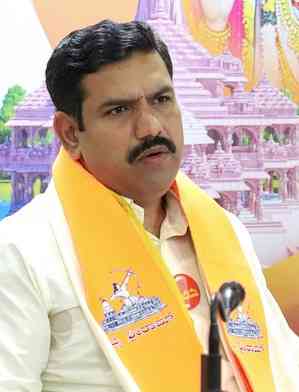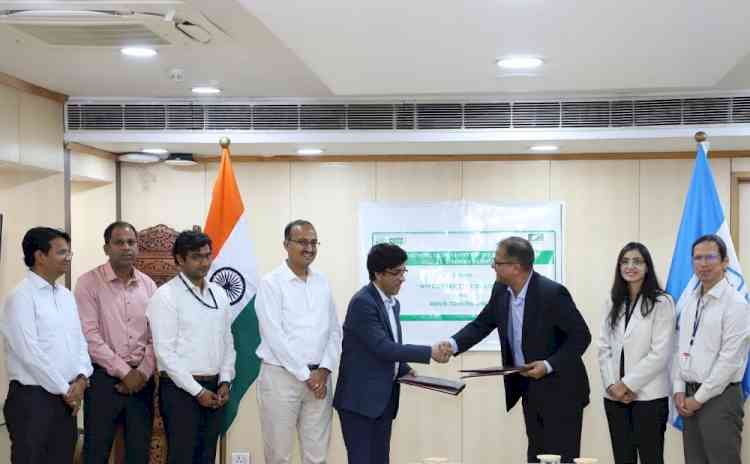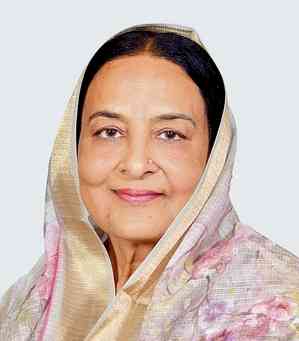8th DST Inspire Internship Camp concludes at PU
Author(s): City Air NewsChandigarh, October 19, 2019: The announcement of 8th DST Inspire Internship camp evoked an excellent response from Haryana, Punjab specifically Govt Schools of Haryana, Meritorious Schools of Punjab. A total number...


Chandigarh, October 19, 2019: The announcement of 8th DST Inspire Internship camp evoked an excellent response from Haryana, Punjab specifically Govt Schools of Haryana, Meritorious Schools of Punjab.
A total number of 407 meritorious students (75% girls) specifically from Govt Schools of Haryana located in the rural areas and Meritorious Schools, Mohali participated in the 8th DST INSPIRE CAMP.
This five-day camp was meticulously designed and planned to expose our young participants to all the frontiers of science, be it chemical, physical, mathematical or biological sciences. Talks by eminent scientists from across India, coupled with a variety of laboratory sessions, Innovative Scientific Idea competition and cultural program, were included as a part of this camp.
8th DST Inspire Internship Camp was inaugurated by Chief Guest Professor Raj Kumar, Honorable Vice-Chancellor, Panjab University at University Law Auditorium. Professor Arvind, IISER Mohali and Professor Patrick Das Gupta, Delhi University, were Guests of Honor. Professor Kanwaljit Chopra, Chairman, University Institute of Pharmaceutical Sciences, Honorary Coordinator of DST Inspire, delivered the welcome address and highlighted the achievements of PU, UIPS and DST Inspire Program Centre. Professor Anil Kumar, Dean, Faculty of Pharmaceutical Sciences, highlighted various opportunities for students available at Panjab University. Dr Anurag Kuhad, Program Coordinator, DST Inspire Internship Camp briefed about the past DST Inspire camps and introduced the students to program schedule of the current DST Inspire camp. Professor Raj Kumar, Vice Chancellor urged the students to take full advantage of this opportunity and do not hesitate to ask question in Hindi/English or Punjabi. Professor Patrick Das Gupta and Professor Arvind highlighted the importance of learning and not to give up at point of their life.
Professor Arvind, Department of Physical Sciences, Indian Institute of Science Education & Research, Mohali, who discussed how emergence of quantum physics has changed our ways of thinking about the world around us and emphasized the recent developments in the area of quantum computers. Professor Patrick Das Gupta, Department of Physics, University of Delhi, New Delhi. He enumerated how basic concepts can dramatic change world.
Afternoon sessions were focused on hands-on exposure to a variety of basic and advanced practical classes in Pharmacy, Anthropology, Zoology, Chemistry and Physics. I am sure several of these experiments must have fascinated our future scientists. We did try to prepare a platter of practical exercises ranging from use of Vernier calipers, to measurement of viscosity, isolation of casein from milk, tablet manufacturing, chromatographic techniques, acid-base titrations, applications of chromatography, titrimetry and study of exothermic reactions, growth of bacteria, techniques for DNA extraction and gel electrophoresis for DNA visualization, and visits to zoology museums to name a few. Various animal models of diseases were also demonstrated to them. Professor M S Marwaha, Former Principal, Sri Guru Gobind Singh College, Sector 26, Chandigarh conducted 20+ experimental demonstration or Physics Stage Show, covering Mechanics, Sound, Wave Motion, Light, Electricity and Magnetism, inspiring them to learn Physics through understanding of concepts in applications in daily life.
Professor Kanwaljit Chopra, Chairperson, UIPS, educated the students to make the right choices to adopt healthy behaviours to arrest the progression of epidemic and lifestyle diseases in adulthood as well as for the country’s future health. Professor Savita Bhatnagar, Professor, Department of Mathematics, PU, introduced the magic number to students and explained how magic numbers play a key role in mathematics.
Professor K K Bhasin, Emeritus Professor, Department of Chemistry, PU, took the students to his childhood days and discussed the importance of chemistry every now and then in our daily life. He narrated the story of discovery and synthesis of ammonium nitrate and about REDOX Reactions its use and misuse. Professor K N Raghavan, The Institute of Mathematical Sciences, Chennai, discussed how about interesting properties of prime numbers, the corner stone of number theory. Professor Mahak Sharma, Department of Biological Sciences, Indian Institute of Science Education & Research, Mohali introduced the discovery of a mechanism by which we can specifically edit or change the sequence of any gene or any DNA molecule in virtually any organism of choice. This powerful technique is based on a simple two component system known as CRISPR-Cas9. First discovered in the simplest of the organisms, bacteria, this technique has taken the research and medical world by storm for its enormous potential applications. It has also raised several ethical concerns regarding how should the scientific community propose to regulate its uses so that the technique is not used for undesirable and unwarranted editing of life forms including humans. Professor SSV Rama Sastry, Department of Chemical Sciences, Indian Institute of Science Education & Research, Mohali emphasized upon catalysts and importance of catalyst induced reactions in chemical sciences.
Dr Anurag Kuhad, Program Coordinator and Assistant Professor of Pharmacology at the University Institute of Pharmaceutical Sciences, highlighted the importance of homeostatic balance in human body and how maintenance of homeostasis can prevent/control incidence of diseases or disorders. Through various interesting visuals, short films, Professor Arun D Ahluwalia, Outreach Specialist Environmental & Earth Sciences, Professor of Eminence (Honorary), School of Biological and Environmental Sciences, Shoolini University, Himachal Pradesh generated excitement in the young audience on various environmental issues threatening India.
And the last lecture of the camp, which was delivered by Professor Deepak Sharma, Professor School of Life Sciences, Jawahar Lal Nehru University, New Delhi again inspired the students with his lecture on the Role of Science in shaping brain, body and behavior. The talk was inclined to sensitize the students on harnessing the brainpower for successful attempt in the exams and reflected on the importance of science in personality development.
In the feedback session, the students said that the camp must be of longer duration. They enjoyed their stay and learning at Panjab University. It is a life time memory for them and they will definitely choose science as their career.
In the afternoon, valedictory function was organized for student’s feedback, mementos, prize and certificate distribution to all Panjab University laboratory mentors, students, escort teachers, volunteer and staff of Panjab University. Inspire students gave very true feedback at valedictory function of DST Inspire camp. They are interested in long question answer sessions with mentors of the camp and suggested to increase the interaction time. Students were satisfied with scientific content of the camp and thoroughly enjoyed hands-on experiments at various PU science departments. Students were quite enthusiastic to know about innovations in basic science and admitted that the camp opened new vista of understanding of science and guide them to choose science as career. Escort teachers also interacted with science faculty of Panjab University and were satisfied with their visit to PU. In nutshell, 6th DST Inspire Internship camp is very fruitful for students.

 cityairnews
cityairnews 
















